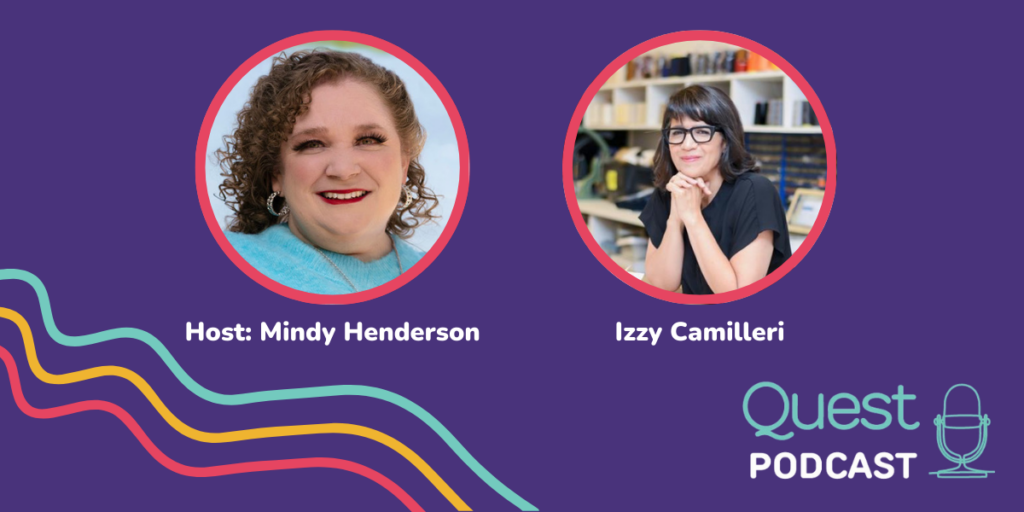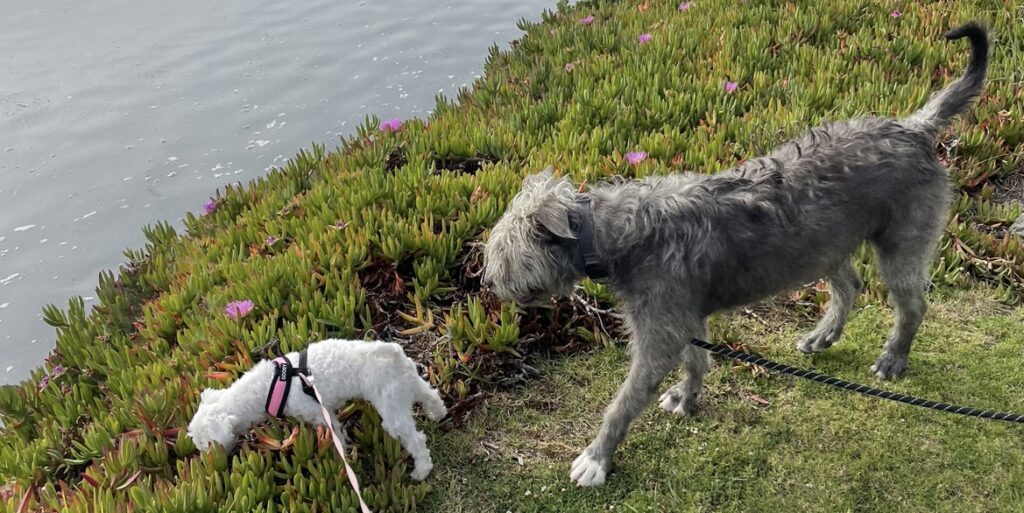
Ambassador Guest Blog: How Fostering Dogs Despite Living with a Disability Gives Me Joy and Purpose
By Nora Ramirez | Friday, November 15, 2024
5 Second Summary
MDA Ambassadors play an essential role in furthering MDA’s mission while representing and empowering the neuromuscular disease community. Quest Ambassador Guest Blog series provides a platform to share their personal stories, perspectives, and experience.
Nora Ramirez lives in California, and was diagnosed with Selenon (SEPN1)-related myopathy (RM) at the age of 9 years old. She is one of four siblings with SEPN1-RM; the other three siblings have passed away, which is one of the reasons why advocacy is such an important topic for her. Nora is a dog mom of two, one of which was a foster, and the other found through a rescue organization. She is also a wife, daughter, and aunt. During her free time, she loves to volunteer for nonprofit organizations, and also help friends, family, and strangers with anything they allow. Helping and creating connections with others is what keeps her grounded, motivated, and provides energy for the days ahead. When she is not volunteering, she is playing video games, drawing, painting, writing, reading, or researching.

Nora Ramirez
Volunteering can be so fulfilling and rewarding. Not only can I help others by volunteering, but it also helps me mentally and emotionally. One way I feel helpful, while also having companionship, is when I foster dogs. Specifically, during the holiday season when shelters are the most overcrowded. My first experience fostering a dog was when I was 22 years old. It was physically a lot easier for me back then, but the increased level of difficulty has not stopped me because of how emotionally rewarding it is. Fostering can be for as little as 2 hours, to weeks or months, the choice is up to you when you sign up. When fostering, all costs are usually covered by the rescue or shelter, which makes it a good option for those who are not able to take on the financial responsibility of owning a dog but would like the companionship. The downside is that when the dog you are caring for gets adopted, you must part ways with them and that can be heartbreaking. However, knowing that you provided them with a warm and loving place while they found their forever home and that they will remember you as a kind soul makes it worthwhile.

The first puppy Nora Ramirez fostered.
For me, the biggest reward is knowing that these dogs are a lot happier in a home rather than in a kennel at the shelter or on the streets. In addition, fostering also increases their chances of adoption. Prospective adopters are able to get a more accurate view of the dog’s personality and temperament when they are in a relaxed and comfortable environment. I am glad I can make the transition smoother and easier for both the dog and the adopter. A lesser-known reward as someone living with a disability, is being able to focus on something other than my disability. There is purpose, joy, and motivation when I can focus on what I can do, instead of what I can’t do. It also feels great that the things that dogs love the most can be given by anyone, regardless of physical conditions, such as attention, petting them, cuddling, and giving them food. The physical pain and mental toll my disability causes me are not going away – both will be in my day-to-day life whether I focus on them or on something else. But for me, it makes my days a lot more enjoyable when I can focus on something other than my symptoms. And believe me, a dog will definitely claim your focus and attention. They are also so forgiving, I feel like they understand if I am having a physically difficult day and just stay home with them to cuddle instead of going for a walk. I find it difficult to maintain the motivation to stay physically active every day, but having a dog makes me at least try. Sometimes I am only able to walk them around my backyard on a difficult day, but most of the time they motivate me to walk them around my street, to get on my scooter and go for an even longer walk, or to go to the park or beach. The joy that dogs demonstrate with the smallest things is contagious, and in turn it brings me joy to do the things they enjoy. I do not see the tasks I do for them as a burden, I am instead thankful that I am able to do something, thankful that I can be helpful, and thankful that such caring, loving, and forgiving creatures exist on this earth. However, it is also not a problem if taking them on walks is not a possibility for someone, there are foster dogs that are seniors, have a disability, or just have the type of personality that prefers to sleep all day. Anyone can be foster dog parent.
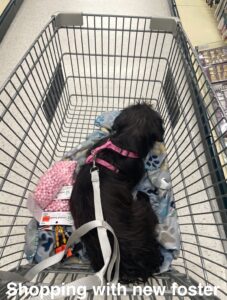
Shopping with a foster puppy
If fostering is something you are interested in doing, decide whether you want to do it through a rescue or a shelter. Both offer different types of support and accommodations when matching applicants. Then, google search animal rescues or shelters in your area, and ask for a foster application. Once you submit it, they will review it, and match you with a dog or cat that fits your preferences and lifestyle. Most of the shelters and rescues will provide you with the food, medication, toys, pen, pads, crate, and anything else they may need. All you need to provide is a home and love.
There is no challenge that makes fostering impossible if that is what you want to do. One of my biggest challenges with fostering dogs is that my physical weakness and limited mobility requires me to adapt tasks to my limitations. After fostering on and off for more than nine years, I have found what does and doesn’t work for me. I have learned to accommodate, adapt, and have patience with myself and my foster dogs.
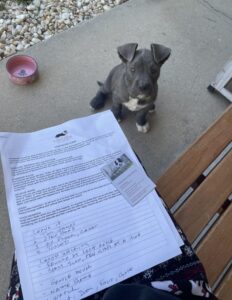
Foster puppy with training homework
We do not have to try to do things the same as everyone else, it is okay to adapt tasks to our abilities. A reacher/grabber tool is a must-have, and the sturdier it is the better. It is helpful for anyone that has trouble bending over or reaching down. I use it to lay down potty pads, to pick-up and throw away the used ones, to clean-up potty accidents on the floor, to pick-up dog toys and beds or blankets, and to put down and pick up food bowls. Having potty pads is also very useful for when I am not able to get up fast enough to let them outside, and they are great for having throughout the night. A playpen is very useful for puppies and small dogs that cannot jump over it. For dogs that are not potty-trained, I use it during the night by putting their bed inside and covering the rest of the floor inside the pen with potty pads. It is a lot less physically exhausting to clean-up one small area, rather than different parts of the house. When I use a playpen, I make sure to have a trash can by it, and a reacher-grabber tool to save my legs the extra steps when cleaning up. I also have a designated dog couch, but any couch or chair will work. Since I am not able to bend over to pick them up, I use treats to lure them onto the couch. Once they are on the couch, I can pick them up or put there leash on from there, or if they’re still too short then I sit down on the couch with them to put their leash or harness on. They can be trained with repetition to jump on a chair or couch when they see the leash. I first use treats to lure them onto the couch, then I combine it with a word like “up” or “jump”. If the dog wears a harness, I leave the leash attached to the D ring on the harness at all times, so when I put the harness on them it already has the leash and it’s a little less work. There are different types of leash and harnesses that attach differently, I would recommend trying different ones out at the store to see which one is the easiest for you to use. Rescue organizations are also sometimes able to drop-off the dog(s) at your home if transportation is a problem. When I foster, I let the organization know about my physical limitations and I ask to get matched with a dog whose personality and physical demands fit within my abilities and lifestyle. I now know that I cannot keep up with an energetic medium or large dog, especially with jumping on me, so I make sure to state that.
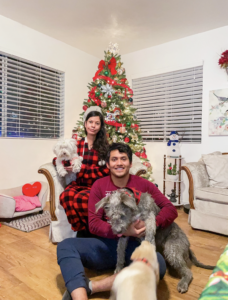
Nora Ramirez and her husband with their adopted dogs during Christmas
Overall, my dog foster care experiences have all been positive in their own ways, and it is why I continue to do it. I do take breaks, I do not do it year-round, but as soon as I feel I have a chance to volunteer I do it again without giving it a second thought. You will not know if it is right for you or not until you give it a chance. For animal lovers, we have so much to gain from this experience, and nothing to lose. You will gain the comfort and love from a furry companion that is a lot more patient and understanding with us than we think. All of the foster dogs I have had throughout the years have brought so much joy to me and my time with them has been worth the challenges and hard work.
Next Steps and Useful Resources
- Browse MDA’s Mental Health Hub.
- MDA’s Resource Center provides support, guidance, and resources for patients and families. Contact the MDA Resource Center at 1-833-ASK-MDA1 or ResourceCenter@mdausa.org
- Stay up-to-date on Quest content! Subscribe to Quest Magazine and Newsletter.
Disclaimer: No content on this site should ever be used as a substitute for direct medical advice from your doctor or other qualified clinician.


